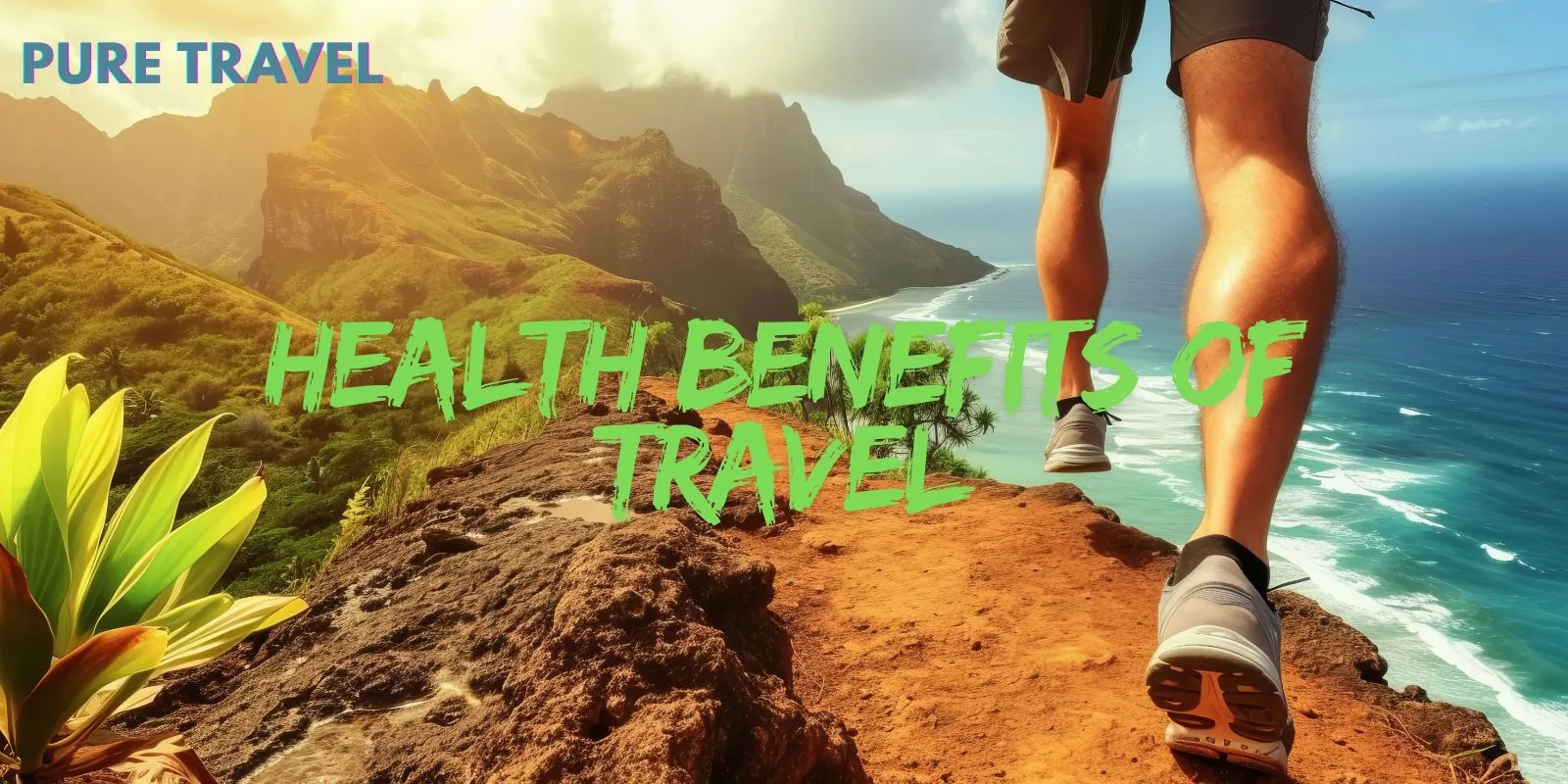Health Benefits of Travel: How Exploring the World Boosts Your Mind and Body
When was the last time you traveled? Did you notice how refreshed, inspired, or simply lighter you felt afterward? Traveling isn’t just about sightseeing — it’s a powerful act of self-care that improves both mental and physical health. From reducing stress to promoting happiness, the health benefits of travel are supported by science and felt by every curious soul who steps outside their comfort zone.
#1 Travel Relieves Stress
Modern life is filled with constant pressure — from work demands to personal responsibilities — leaving little time to breathe. Travel acts as a reset button for your mind and body. Stepping into a new environment gives your brain a break from routine stressors and allows you to relax, reflect, and return home recharged. Even short weekend trips can significantly lower cortisol (the stress hormone) and boost your mood.
Travel also encourages mindfulness by pulling you into the present moment. When you’re exploring new surroundings, your focus shifts from deadlines and worries to sights, sounds, and sensations. This mental break helps quiet overthinking and promotes emotional balance. As you immerse yourself in unfamiliar experiences — whether it’s walking along a quiet beach or navigating a bustling market — your mind resets, restoring clarity and calm long after the journey ends.
#2 Travel Promotes Physical Activity
Many people spend long hours sitting — at desks, in cars, or on couches. When you travel, movement becomes part of the experience. Exploring new cities, hiking through nature, or simply walking between attractions increases your daily activity levels. This not only improves cardiovascular health but also boosts energy and helps maintain a healthy weight — without feeling like exercise.
Beyond just movement, travel naturally introduces variety into your physical routine. Different terrains, climates, and activities engage new muscle groups and enhance overall flexibility and stamina. Whether you’re swimming in the ocean, climbing a hilltop, or strolling through local markets, your body benefits from functional, low-impact exercise that feels enjoyable rather than forced. These spontaneous bursts of activity can reinvigorate your metabolism and improve posture and circulation — all while you’re simply enjoying the journey.
#3 Travel Makes You Happy
New experiences stimulate your brain’s reward system, releasing feel-good hormones like dopamine and serotonin. When you travel to new places and discover new cultures, you replace monotony with joy and curiosity. These happy experiences build emotional resilience, making it easier to cope with life’s challenges once you return home.
Travel also gives you something to look forward to — from the moment you plan your trip to the memories you carry afterward. This anticipation alone can lift your mood and reduce anxiety. Meeting new people, tasting unfamiliar foods, and embracing spontaneous adventures spark creativity and connection, both key components of lasting happiness. Over time, these joyful experiences expand your sense of gratitude and fulfillment, reminding you that happiness often comes from exploration, not possessions.
#4 Travel Fights Depression – Health Benefits of Travel
Recent research shows that regular travel can reduce symptoms of depression and anxiety. Changing your surroundings helps your brain disconnect from negative thought patterns and encourages new perspectives. Exposure to sunlight, social interactions, and a sense of novelty all contribute to better mood regulation. Traveling also promotes better sleep — a crucial factor in maintaining emotional balance.
Health Benefits of Travel – Travel provides a natural form of therapy by immersing you in new environments that inspire positivity and wonder. The act of exploring unfamiliar places helps shift your mental focus from internal worries to external experiences, giving your mind a much-needed reset. Engaging in enjoyable activities — like sightseeing, meeting locals, or simply appreciating nature — stimulates the release of endorphins, which combat feelings of sadness and fatigue. Over time, these uplifting moments can help rewire your emotional responses, making it easier to manage stress and maintain a more optimistic outlook on life.
#5 Travel Encourages Personal Development
Every trip is a lesson. Traveling exposes you to new languages, customs, and people, helping you grow emotionally and intellectually. You improve your communication and problem-solving skills as you navigate unfamiliar places. Travel teaches patience, adaptability, and empathy — qualities that enhance both your personal and professional life.
Travel also builds confidence by pushing you beyond your comfort zone. Whether it’s navigating public transport in a foreign city or trying an activity you’ve never done before, each challenge you overcome reinforces self-trust and independence. These experiences cultivate a growth mindset — helping you see obstacles as opportunities to learn rather than setbacks. As you adapt to new situations and connect with diverse people, you gain a deeper understanding of yourself and your place in the world, fostering continuous personal evolution.
#6 Travel Broadens Your Horizons
When you explore different regions and cultures, you begin to see the world through a wider lens. You learn to appreciate diversity, challenge assumptions, and embrace new ways of thinking. Each journey expands your worldview, making you more open-minded and culturally aware — essential traits for personal growth in a globalized world.
Health Benefits of Travel – Travel also deepens your sense of empathy and connection to humanity. Immersing yourself in different lifestyles and traditions allows you to understand that while cultures vary, human values like kindness, family, and joy are universal. This awareness nurtures tolerance and respect for others, reducing prejudice and expanding your emotional intelligence. By witnessing how people live and thrive in diverse conditions, you not only gain perspective on global issues but also develop gratitude for your own life — a mindset that continues to enrich you long after the trip ends.
#7 Travel Helps You Live Longer
Happiness, reduced stress, and physical activity — all linked to travel — play a vital role in longevity. Studies have shown that people who travel frequently are less likely to experience chronic stress, heart disease, and depression. By giving your mind and body regular opportunities to reset, you enhance your overall wellbeing and may even extend your lifespan.
Health Benefits of Travel – While travel moments may be temporary, the positive impact they leave on your health and memories lasts a lifetime. Travel is one of the most rewarding forms of education, teaching you about yourself and the world in equal measure. So pack your bags, chase experiences, and prioritize exploration — life is too short to live in routine.
FAQ: Health Benefits of Travel
1. How does travel reduce stress?
Travel removes you from daily pressures and provides a mental reset. Exploring new environments helps lower cortisol levels, reduces anxiety, and promotes mindfulness. Immersing yourself in fresh surroundings allows your mind to relax and return home recharged.
2. Can travel really improve physical health?
Yes, travel encourages movement through activities like walking, hiking, or swimming. These natural forms of exercise improve cardiovascular health, boost energy levels, and support healthy weight management — all while you enjoy new experiences.
3. How does traveling affect mental health and happiness?
Travel triggers the release of dopamine and serotonin, the brain’s “feel-good” chemicals. It provides excitement, anticipation, and joy through discovery and novelty. Meeting new people, exploring cultures, and experiencing beauty in nature all build emotional resilience and long-term happiness.
4. Does travel help fight depression or anxiety?
Yes. Changing your environment interrupts negative thought cycles and exposes you to positive stimuli like sunlight, social connection, and new experiences. This combination can lift mood, improve sleep, and help manage symptoms of depression or anxiety.
5. Can traveling really help you live longer?
Research suggests that regular travelers experience lower stress, better heart health, and improved emotional well-being — all contributing factors to longevity. Travel nurtures balance in body, mind, and spirit, supporting a longer, healthier, and more fulfilling life.
Your Journey Toward Wellness
Every journey you take — near or far — contributes to your overall wellness. Traveling nurtures the mind through discovery, the body through movement, and the soul through connection. So, the next time you plan a getaway, remember you’re not just collecting stamps on your passport — you’re investing in your health, happiness, and longevity.







